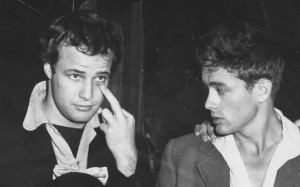I’ll admit it. I just don’t get it. The whole James Dean thing. Never have, never will.
There is something about him. He has a captivating presence. That much is undeniable. He cultivated that wounded puppy personality, when if cornered or threatened would sneer and snarl and might just bite. This created quite a confusion of primal urges within the young women of the mid 1950s, nurturing maternal instincts warring with libidinous stirrings which went beyond mere schoolgirl crushes. They were conflicted as to whether they wanted to fix him or fuck him. Probably both.
Beyond that, though? Other than his appeal as the literal poster boy for rebellion, reckless abandon, and teen angst, I personally can’t be convinced that there’s more than meets the eye. If so, I sure don’t see it. Elia Kazan, who directed Brando three times and Dean in East of Eden may have said it best with this succinct assessment passed on to John Steinbeck: “I don’t like the guy, but he’s it.”
The personal stories and cultural symbols of Marlon Brando and James Dean are so similar, so intertwined, so synonymous with one another and, yet, so divisive. Both were overly sensitive Mid-western farm boys, Dean from Indiana and Brando born and raised in Omaha, Nebraska. Each struggled throughout their lives, and never seemed to come to terms with, the rejection of their fathers and premature death of their mothers. Seeking acceptance to fill emotional voids which they each, at the slightest warning sign that someone may actually breach that great divide, would often pre-emptively repudiate, their lives would both be marked by a string of failed, fleeting relationships. Because Brando and Dean both exhibited tender, feminine traits both on screen and off, there is speculation regarding bi-sexuality that persist to this day.
They each spent time crashing on the couches of friends or total strangers in New York, leading both through the doors of the Stanislovskian Actor’s Studio where their natural gifts of mimicry and desperate need for approval would begin to mesh into more finely-tuned creative impulses. Both would experience difficulties with legendary acting coach Lee Strasberg. Marlon would unfailingly praise his teacher Stella Adler for helping him develop the techniques which would give nuance and subtext to his rough talent, but would recall Strasberg unfavorably in his memoirs Songs My Mother Taught Me as an “ambitious, selfish, tasteless, and untalented” man who would claim credit for the rising and setting of the sun if he could get away with it. Dean would walk abruptly out of the studio door and onto 44th Street after Strasberg criticized his very first performance.
Elia Kazan, co-founder of the Actor’s Studio, would figure prominently in launching the film careers of both untested youngsters, a predilection which would also serve beneficiaries the likes of Karl Malden, Lee J. Cobb, Eva Marie Saint, Julie Harris, Andy Griffith, Eli Wallach, and Warren Beatty. Kazan directed Brando in both the stage and screen adaptations of A Streetcar Named Desire, urging Marlon to visit Tennessee Williams in New Orleans to attain the playwright’s personal approval and would similarly, as mentioned earlier, ship Dean off to Northern California to meet with John Steinbeck about doing East of Eden.
Brando is nothing short of brilliant in Streetcar, putting on proud display the perfect and necessary mixture of unchecked aggression and animal magnetism to allow his Stanley Kowalski to drip with sweat, sarcasm, and sexual tension. Lurking and leering, taunting and terrorizing. The unpredictably explosive nature of Kowalski’s demeanor memorably boils over when Brando clears his place at the table by smashing his plate and delivering a frightening and indignant lecture on being insulted in his own home where, according to Huey Long, he is king. Hurling his coffee cup against the wall beside a cowering Stella and Blanche for emphasis before asking, “My place is all cleared up now, you want me to clear yours?”
Dean, on the other hand, makes hollow attempts at fits of rage in East of Eden which come across as petulant histrionics devoid of Brando’s underlying menace. Melodramatic and unconvincing. I don’t buy it. A poor man’s Marlon (himself a moody, brooding vagabond), James Dean was a pretender to Brando’s throne, a court jester dressed quite literally in the emperor’s clothes. Dean intentionally masqueraded in the blue jeans and boots, tight white t-shirt and leather jacket assumed by Brando in The Wild One, although this outfit Brando always considered ill-fitting and uncomfortable and eager to shed.
His non-conformist tendencies and struggles with authority Brando would never completely cast away, rightfully earning him alternating reputations as an insufferable prick or merry prankster, thoughtless scoundrel or vulnerable man-child.
Dean would be disabused of his pre-conceived notions when he finally got to meet his hero at a party. Decked out in his Wild One get-up, Dean was mortified to find Brando looking quite dashing and flung his motorcycle jacket on the floor in narcissistic affectation, earning him a sharp rebuke from Marlon. Dean would prepare for early auditions by memorizing and reciting Brando’s lines from Streetcar, aping Marlon’s emotions and movements.
Marlon Brando was invited in 1947 to film a screen test for an early version of Rebel Without a Cause, a totally separate entity from the Dean release eight years later, one which James would, of course not live to see. In a dirty ditch on the side of California Highway 466 lay James Dean’s smashed Porsche Spyder inside of which were the heart-throb’s broken body, unrealized dreams, and unfulfilled future. Out of the smoking wreckage, however, would emerge a lasting and towering legacy built upon the foolish, flimsy foundation of the romantic glorification bestowed upon living fast and dying young.
I feel as though it is considered by many to be detrimental to Brando’s place in history that he lived long enough to (not unlike Elvis and Orson Welles before him) become a grossly inflated, literally larger than life caricature of his former self, Dr. Moreau a hideous mirror image of Terry Malloy, Vito Corleone, and Colonel Kurtz. As his girth expanded and his public profile diminished, he provided fodder for tabloids, stand-up comedians, shock-jock DJs, and even The Simpsons.
Brando’s social activism and civil disobedience are worthy of mention, his attendance of Martin Luther King Jr.’s March on Washington and famously refusing to accept the 1973 Best Actor Oscar for The Godfather, sending in his stead Apache spokeswoman Sacheen Littlefeather to read a brief statement prepared by Brando voicing his displeasure of Hollywood’s depiction of Native Americans.
You want to debate rebellion? It doesn’t get much more badass than that.
It should also be pointed out that Brando had mostly fond memories of his younger counterpart, reminiscing about James Dean in his autobiography as a kind of little brother figure looking for a mentor. The two socialized but never became close and, growing weary over time of the flattery and idolatry, Brando imparted some sage advice to his young admirer about recognizing and appreciating the best aspects of himself rather than try to transform into an approximation of what he perceived Marlon to be. Robbed of the knowledge of the kind of actor and human being Dean may have evolved into, Brando, like everyone else, expressed frustration that he instead “became entombed in his own myth.”

 July 21st, 2015
July 21st, 2015  CEO
CEO 

 Posted in
Posted in  Tags:
Tags: 



